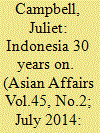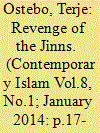| Srl | Item |
| 1 |
ID:
132347


|
|
|
|
|
| Publication |
2014.
|
| Summary/Abstract |
An account of the 2013 tour to Indonesia which encompassed Jakarta, Central and Eastern Java, Sulawesi and Torajaland, as well as Bali. Beyond visits to world famous tourist sites like Borobodur, Prambanan and the island of Bali, the members of the tour party tried to come to an understanding of the diversity of modern Indonesia, its politics, its economic prospects and the role of Islam. The party had a number of meetings with prominent actors in modern Indonesia, the world's largest Muslim state. Economic prospects are promising and the Presidential elections in July 2014 and their result will give an indication of the country's likely trajectory.
|
|
|
|
|
|
|
|
|
|
|
|
|
|
|
|
| 2 |
ID:
131476


|
|
|
|
|
| Publication |
2014.
|
| Summary/Abstract |
The point of departure for this article is a story about jinns taking revenge upon people who have abandoned earlier religious practices. It is a powerful account of their attempt to free themselves from a past viewed as inhabited by evil forces and about the encounter between contemporary Salafi reformism and a presumed disappearing religious universe. It serves to prove how a novel version of Islam has superseded former practices; delegitimized and categorized as belonging to the past. The story is, however, also an important source and an interesting entry-point to examine the continued relevance of past practices within processes of reform. Analyzing the story about the jinns and the trajectory of Salafi reform in Bale, this contribution demonstrates how the past remains intersected with present reformism, and how both former practices and novel impetuses are reconfigured through this process. The article pays attention to the dialectics of negotiations inherent to processes of reform and points to the manner in which the involvement of a range of different actors produces idiosyncratic results. It challenges notions of contemporary Islamic reform as something linear and fixed and argues that such processes are multifaceted and open-ended.
|
|
|
|
|
|
|
|
|
|
|
|
|
|
|
|